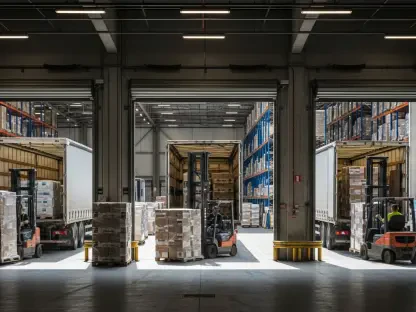The upcoming Import Control System 2 (ICS2) regulation is set to significantly impact the transport and logistics industry. Introduced by customs authorities in the European Union (EU), ICS2 aims to enhance the safety and security of goods entering the EU, Norway, Switzerland, and Northern Ireland via sea, road, or rail. While the regulation has been in place for air cargo since 2023, it will start applying to sea transport in June 2024 and extend to road and rail imports in 2025.
This regulation requires detailed information about imported goods to be provided either before loading or prior to arriving at the EU border. The legislation focuses on increasing the security of the global supply chain and safeguarding consumer safety with strict data requirements. Key to this process is the utilization of 6-digit Harmonized System (HS) codes for each item in a consignment, along with comprehensive descriptions and detailed information about buyers and sellers.
Understanding ICS2 and Its Importance
The significance of the ICS2 regulation cannot be understated, with various global and European trade associations such as the World Shipping Council and the International Federation of Freight Forwarders stressing the importance of these controls. Their unified alert shines a spotlight on the immense impact ICS2 will have on the movement of goods within the European Customs Territory by sea, road, and rail. These associations underscore that lack of preparedness could cause severe disruptions and delays.
Promoting safety and security within the EU, the regulation demands thorough and precise data. This ensures all stakeholders involved are aware of the requirements and prepared to comply. The stringent data submission requirements advance the goal of enhancing overall security by accurately documenting goods before they reach the EU custom borders. In addition, timely submission of the necessary information allows for better monitoring and risk assessment, decreasing the chance of illegal activities and streamlining workflow for compliant entities.
Key Features of ICS2
Enhanced from its predecessor ICS-1, ICS2 introduces a suite of new features designed to facilitate compliance and bolster the efficiency of trade operations. Among the key improvements is a single-entry point for submitting advance cargo information (ACI). This simplification makes it easier for industry stakeholders to comply confidently, reducing the administrative burden.
Another prominent feature is the updated risk assessment system, enabling customs authorities to assess risks and prioritize inspections effectively. By focusing resources on higher-risk shipments, the system enhances the overall security of the supply chain. This strategic approach ensures that customs authorities can act swiftly and appropriately on potentially dangerous or non-compliant goods, minimizing the risk of threats to the region.
Further, ICS2 includes a secure messaging system promoting better communication and information exchange between customs authorities and industry. This system encourages real-time communication, allowing for faster resolution of compliance issues and improving coordination among all parties involved. A crucial factor in this entire process is the flexible framework designed to adapt to changing trade practices and evolving logistics operations, ensuring the system remains robust and relevant.
Preparing for ICS2 Compliance
To effectively manage risks and ensure strict compliance with ICS2, businesses engaged in the EU supply chain must prepare proactively and thoroughly. Preparation includes establishing the necessary technical infrastructure and processes to meet extensive data submission requirements. The European Commission’s website provides valuable information and comprehensive guidance to support businesses as they navigate the changes.
Failing to comply with ICS2 may result in significant operational disruption, leading to delays and complexities in importing and exporting goods involving the EU. Moreover, businesses face potential legal implications, such as fines and penalties, depending on the practices of individual EU Member States. The importance of preparation and adherence to these guidelines cannot be overstressed, as the impact on businesses’ operations and reputation can be profound.
Proactive engagement with industry professionals, implementing robust internal processes, and seeking continuous updates on ICS2 are critical steps toward seamless compliance. By investing in better data management systems, refining processes for accuracy, and keeping communication channels open, businesses can safeguard against non-compliance and ensure a smoother transition into the new regulatory landscape.
The Role of Data in the New Regulation
Bryn Heimbeck, President and Co-founder of Trade Tech, a global logistics platform, highlights the growing complexity within the international trade landscape. His emphasis on data underscores its critical role in the seamless movement of freight. Accurate and timely data submission under ICS2 is crucial to avoid disruptions that can arise from incorrect or delayed information.
Entities in the transportation sectors, including trucking, rail, and ocean shipping, must ensure adequate infrastructure, processes, and procedures are in place. Preparing to submit ACI via the ICS2 system is vital for vessel operators starting in June 2024 and for house bill filers by December 2024. Accurate data submission is indispensable for smooth operations and maintaining overall supply chain security.
Given the increasing volume and complexity of global trade, leveraging technology and aligning internal data processes with regulatory requirements is a strategic necessity. By prioritizing data accuracy and compliance, businesses can keep their operations streamlined, minimize risks, and enhance their capacity to withstand regulatory scrutiny within the European Customs Territory.
Collaborative Efforts and Resources
The upgraded ICS2 builds on the earlier ICS-1, offering new features to boost compliance and streamline trade operations. A major enhancement is the single-entry point for submitting advance cargo information (ACI), which simplifies compliance for industry participants and reduces administrative workload.
Additionally, the revamped risk assessment system allows customs authorities to efficiently evaluate risks, concentrating on high-risk shipments. This targeted approach improves supply chain security by ensuring customs can quickly address potentially dangerous or non-compliant goods, thereby minimizing regional threats.
Moreover, ICS2 features a secure messaging system that enhances communication and information sharing between customs authorities and the industry. This system fosters real-time communication, enabling quicker resolution of compliance issues and better coordination among all involved parties. The flexible framework of ICS2 is a key aspect, designed to adapt to evolving trade practices and logistics operations. This ensures that the system remains robust, adaptable, and relevant in the face of changing industry needs and challenges.









